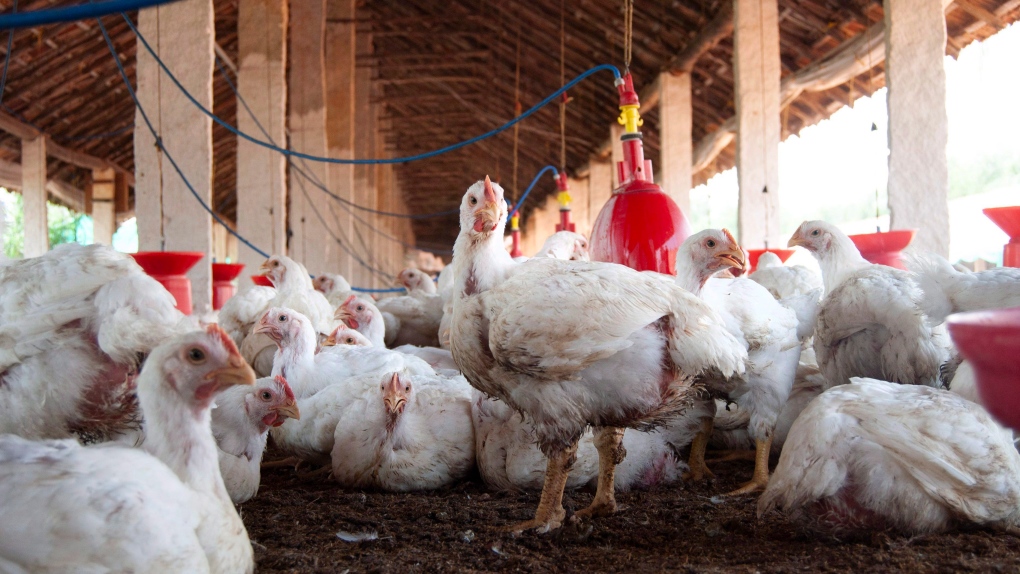Avian flu detected on 17 Manitoba farms
 Poultry can be seen in this photograph by The Canadian Press (THE CANADIAN PRESS/Aleksandra Sagan)
Poultry can be seen in this photograph by The Canadian Press (THE CANADIAN PRESS/Aleksandra Sagan)
The highly-infectious avian influenza, also known as bird flu, has been detected in farms across Canada, including several in Manitoba.
According to the Canadian Food Inspection Agency, bird flu has been detected on 17 farms in Manitoba over the last few months, most of which are commercial poultry operations. These farms are located in the RM of Bifrost-Riverton, the RM of Ste. Anne, the RM of De Salaberry, the RM of Rockwood, as well as a few other communities.
The government agency reports that 289,000 birds in Manitoba have been impacted by the virus.
The Manitoba government recommends that owners of poultry and non-poultry flocks keep their flocks inside at least until spring migration has passed.
The province also advises of the following precautions:
- The trade, sale and exhibition of live birds between flocks should be stopped until the risk of bird flu is reduced. The purchase of chicks from licensed and inspected hatcheries is safe;
- Prevent contact between flocks and wild birds. Feed spills should be cleaned immediately, and dead birds and manure should not be stored near flocks;
- Ensure all clothes, shoes, equipment and materials that come into contact with flocks are clean. Feeding and watering equipment should be frequently cleaned;
- Small flock and non-commercial flock owners must complete an application with Manitoba’s Premises Identification Program;
- Contact a veterinarian immediately if there are any increases in sudden deaths or respiratory signs in a flock.
According to the Canadian Food Inspection Agency, there is no evidence that shows eating cooked poultry or eggs could transmit avian influenza to humans.
CTVNews.ca Top Stories

Tracking Hurricane Milton: Storm becomes world's strongest of 2024
After reaching peak intensity with wind speeds of 180 m.p.h. (285 km/h) on Monday night, Milton became the strongest storm on our planet for 2024.
Hurricane Milton will likely hit Florida cities like Orlando, Tampa and Daytona Beach
Hurricane Milton is expected to leave a path of devastation across central Florida, from Tampa in the west to Daytona Beach in the east.
'This is just horrific': Meteorologist becomes emotional while providing Hurricane Milton update
A seasoned American meteorologist became emotional on air as he gave an update on a major hurricane, later suggesting the reason behind his strong reaction.
'A cause for concern': Canadian universities slip down world ranking list
An organization that ranks the best universities across the globe says its latest report shows a concerning trend that several of Canada’s institutions are slipping down its list.
B.C. man convicted of killing neighbour's chihuahua to protect his chickens
A British Columbia provincial court judge says a Boston Bar man who shot a teacup Chihuahua named Bear claiming it was menacing his chickens was not justified in killing the animal.
Liberals considering proroguing Parliament amid document impasse? Freeland says 'no'
The minority Liberal government is not considering proroguing Parliament, Deputy Prime Minister Chrystia Freeland said Tuesday, despite persisting uncertainty over who is willing to keep propping them up and procedural wrangling over a Conservative led-privilege debate.
Hertz tells B.C. tribunal online reservations do not 'guarantee' an available car
A man who showed up at a rental car company only to be told his online reservation would not be honoured is entitled to compensation, B.C.'s small claims tribunal has ruled.
'Extremely disappointed': Family of homicide victim storms out of courtroom as judge reads decision
Emotions boiled over after a judge acquitted two out of three defendants in a manslaughter case, while the third accused has since died.
'I find it really disheartening': Family calls out police after Ottawa senior falls victim to theft in parking lot
On September 11, Madeleine Gervais was the victim of a theft in Ottawa's west end. It happened in the Loblaws parking lot in College Square, when she was approached by a man and a woman who insisted to help her load her groceries into her car.

































